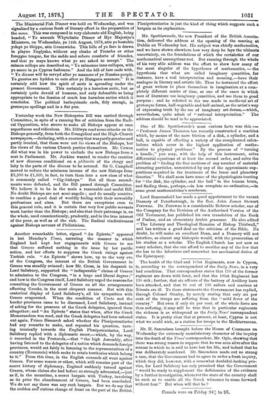Yesterday week the New Bishoprics Bill was carried through Committee,
in spite of a running fire of criticism from the Radi- cal Opposition, who strove to make all Bishops appear at once superfluous and ridiculous. Mr. Dillwyn read some attacks on the Bishops generally, from both the Evangelical and the High-Church newspapers,—declaring, with a courtesy that was partly genuine and partly ironical, that these were not his views of the Bishops, but the views of the various Church parties themselves. Mr. Cowen did what was in his power to exclude the new Bishops from a seat in Parliament. Mr. Jenkins wanted to render the creation of new dioceses conditional on a plibiscite of the clergy and laity in the parts of the diocese to be severed. Sir G. Campbell moved to reduce the minimum income of the new Bishops from 13,500 to £1,500, in fact, to turn them into a new class of what is commonly called "Gig-bishops." But all these amend- ments were defeated, and the Bill passed through Committee. We believe it to be in the main a reasonable and useful Bill. No doubt Bishops are not semi-angelic ; and do usually contrive to combine a good deal of worldly feeling with their unworldly professions and aims. But there are exceptions even to this general rule, and it is certain that very few public servants work harder than the Bishops ; and also that their patronage is, on the whole, used conscientiously, prudently, and in the true interest of the poor, as well as of the rich. The Radical vindictiveness against Bishops savours of Philistinism.






























 Previous page
Previous page